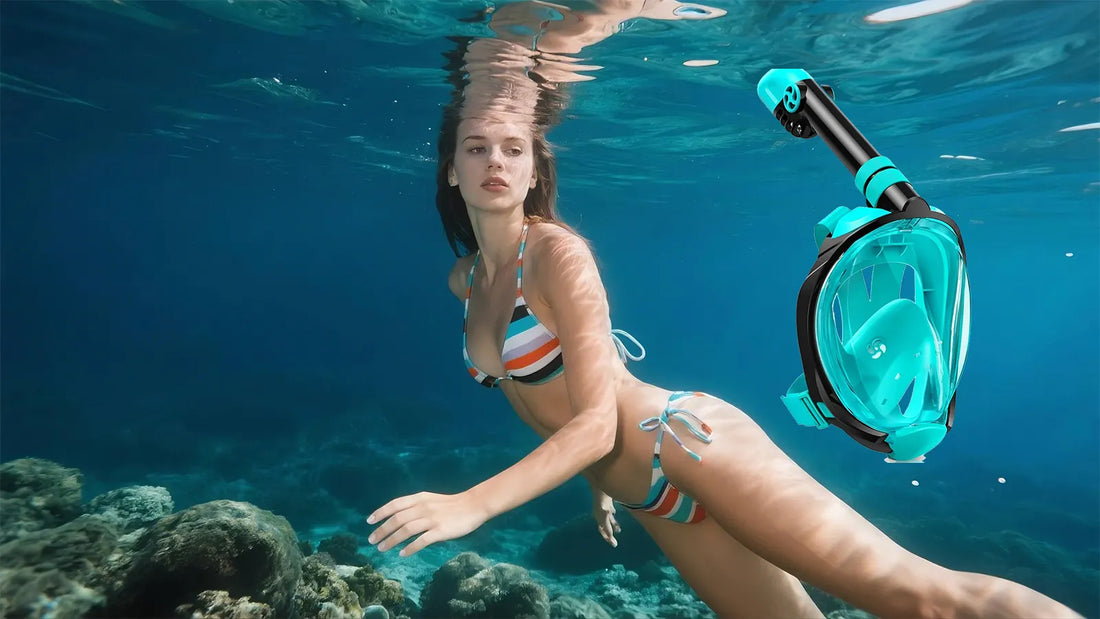Have you ever wondered why full face snorkel masks are not allowed in Hawaii? This tropical paradise, known for its stunning coral reefs and vibrant marine life, has implemented restrictions on these popular snorkeling accessories. While they may seem like a convenient and innovative way to explore the underwater world, there are compelling reasons behind this decision. Let's dive deeper into the factors that led to this ban and what it means for snorkelers visiting Hawaii.
Safety Concerns with Full Face Snorkel Masks
One of the primary reasons full face snorkel masks are not allowed in Hawaii is due to safety concerns. These masks cover the entire face, which can lead to a buildup of carbon dioxide inside the mask. When snorkelers exhale, the carbon dioxide may not be properly expelled, increasing the risk of dizziness, unconsciousness, or even drowning. Traditional snorkel masks, which only cover the eyes and nose, allow for better air circulation and reduce this risk.
Additionally, full face snorkel masks can make it difficult to clear water from the breathing tube. In traditional snorkels, users can easily blow out water that enters the tube. However, with full face masks, this process is more complicated and can be dangerous if not done correctly. This limitation can be particularly hazardous for inexperienced snorkelers who may panic in such situations.
Environmental Impact on Marine Ecosystems
Another significant factor behind the ban is the potential environmental impact of full face snorkel masks. Hawaii's coral reefs are delicate ecosystems that are already under threat from climate change, pollution, and over-tourism. Full face masks can contribute to these problems in several ways. For instance, the design of these masks often requires users to breathe more heavily, which can lead to increased carbon dioxide emissions in the water. This can affect the pH levels of the ocean, further stressing coral reefs and marine life.
Moreover, the materials used in full face snorkel masks are not always environmentally friendly. Many of these masks are made from non-biodegradable plastics that can break down into microplastics, polluting the ocean and harming marine organisms. By restricting the use of these masks, Hawaii aims to protect its precious marine ecosystems and promote sustainable tourism practices.
Regulatory Measures and Enforcement
The decision to ban full face snorkel masks in Hawaii is also supported by regulatory measures. Local authorities have conducted extensive research and consulted with marine biologists, safety experts, and tourism operators to assess the risks associated with these masks. Based on their findings, they have implemented regulations to ensure the safety of snorkelers and the preservation of marine environments.
Enforcement of these regulations is carried out by lifeguards, tour operators, and park rangers who monitor snorkeling activities in popular areas. Visitors are encouraged to use traditional snorkeling gear that meets safety standards and minimizes environmental impact. By adhering to these guidelines, snorkelers can enjoy Hawaii's underwater wonders responsibly and safely.
Alternatives to Full Face Snorkel Masks
For those planning to snorkel in Hawaii, there are plenty of alternatives to full face masks that offer a safe and enjoyable experience. Traditional snorkel masks, paired with a separate snorkel tube, remain the most popular choice. These masks are designed to provide clear visibility and easy breathing while allowing users to quickly clear water from the snorkel.
Another option is the use of dry snorkels, which feature a valve at the top to prevent water from entering the tube. This design is particularly useful for beginners or those who prefer a hassle-free snorkeling experience. Additionally, many snorkelers opt for eco-friendly gear made from sustainable materials to reduce their environmental footprint.
Educating Snorkelers on Responsible Practices
Education plays a crucial role in promoting responsible snorkeling practices in Hawaii. Tour operators and local organizations often provide briefings on safety guidelines, environmental awareness, and proper snorkeling techniques before visitors enter the water. These sessions emphasize the importance of respecting marine life, avoiding contact with coral reefs, and using appropriate gear.
By educating snorkelers, Hawaii aims to create a culture of conservation and safety that benefits both visitors and the environment. This proactive approach helps ensure that future generations can continue to enjoy the beauty and diversity of Hawaii's underwater world.
So, the next time you plan a snorkeling adventure in Hawaii, remember to leave your full face snorkel mask at home. Opt for traditional gear that prioritizes safety and sustainability, and embrace the opportunity to explore the ocean responsibly. By doing so, you'll not only protect yourself but also contribute to the preservation of Hawaii's breathtaking marine ecosystems.

